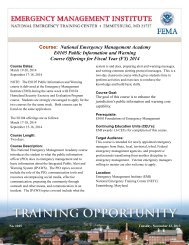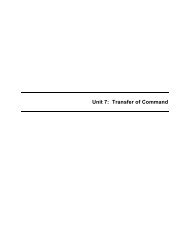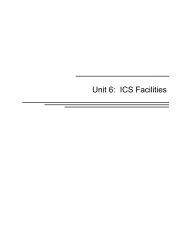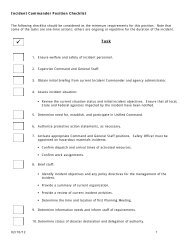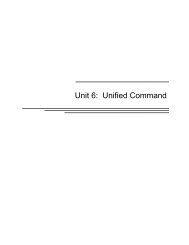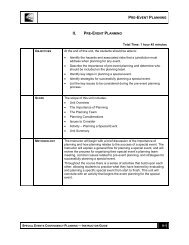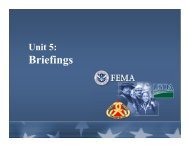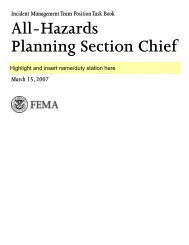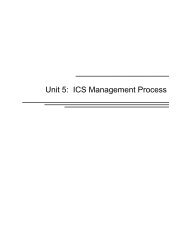EMI Course Catalog - Emergency Management Institute - Federal ...
EMI Course Catalog - Emergency Management Institute - Federal ...
EMI Course Catalog - Emergency Management Institute - Federal ...
You also want an ePaper? Increase the reach of your titles
YUMPU automatically turns print PDFs into web optimized ePapers that Google loves.
STATE/LOCAL/TRIBAL FIELD<br />
COURSES—PREPAREDNESS<br />
EmErgEncy managEmEnt InstItutE • 2011-2012 • catalog of coursEs<br />
Selection Criteria: Local and State emergency managers<br />
who respond to hazardous weather events.<br />
Warning Coordination (G272)<br />
This 1½-day field course is the latest in the hazardous<br />
weather series of courses produced in partnership<br />
with the National Weather Service (NWS).<br />
Every year the United States experiences more severe<br />
weather than any other country in the world. In<br />
order to reduce deaths, injuries, and property losses,<br />
emergency managers must work closely with the<br />
NWS and the news media to provide effective warnings<br />
that can be received and understood by people<br />
at risk. This course is intended to help facilitate that<br />
process.<br />
<strong>Course</strong> topics include The Social Dimensions of<br />
Warning Response; Developing Effective Warning<br />
Messages; Developing an Effective Community<br />
Warning Process; and Working with the News Media<br />
to Create a Weather Warning Partnership. In addition<br />
to lecture and discussion, the course includes case<br />
studies, exercises, and an opportunity for interaction<br />
with representatives of the local news media.<br />
Selection Criteria: Intended for local emergency<br />
managers.<br />
GENERAL ICS INSTRUCTOR GUIDELINES<br />
The National Integration Center (NIC) is responsible<br />
for “facilitating the development of national<br />
guidelines for incident management training and<br />
exercises at all jurisdictional levels, while individual<br />
agencies and organizations are responsible for establishing<br />
and certifying instructors.” The NIC provides<br />
guidelines for Incident Command System (ICS)<br />
instructors.<br />
While individual agencies and organizations are<br />
responsible for establishing and certifying instructors,<br />
the NIC urges those agencies and organizations<br />
to follow these guidelines.<br />
The NIC recommends the following general<br />
instructor guidelines:<br />
FEdErAL EmErgENCy mANAgEmENT AgENCy 96<br />
Instructor Levels<br />
• Lead instructors must have sufficient experience<br />
in presenting all units of the course to be capable<br />
of last-minute substitution for unit instructors.<br />
• Unit instructors must be experienced in the<br />
lesson content they are presenting.<br />
• Adjunct instructors may provide limited<br />
instruction in specialized knowledge and skills<br />
at the discretion of the lead instructor. Adjunct<br />
instructors must be experienced, proficient, and<br />
knowledgeable of current issues in their field of<br />
expertise.<br />
Training Requirements for Lead and Unit<br />
Instructors<br />
Instructors should have formal instructor training<br />
(NWCG Facilitative Instructor, M-410, <strong>EMI</strong> Master<br />
Trainer Program, Office for Domestic Preparedness<br />
Instructor <strong>Course</strong>, or equivalent).<br />
Intermediate Incident Command System<br />
(ICS) for Expanding Incidents, ICS-300<br />
(G300)<br />
This course provides training on and resources for<br />
personnel who require advanced application of<br />
the Incident Command System (ICS). This course<br />
expands upon information covered in the ICS-100<br />
and ICS-200 courses.<br />
The course objectives are as follows:<br />
• Describe how the National Incident <strong>Management</strong><br />
System (NIMS) Command and <strong>Management</strong><br />
component supports the management of<br />
expanding incidents.<br />
• Describe the incident/event management process<br />
for supervisors and expanding incidents as<br />
prescribed by the Incident Command System<br />
(ICS).<br />
• Implement the incident management process on<br />
a simulated Type 3 incident.<br />
• Develop an Incident Action Plan for a simulated<br />
incident.



